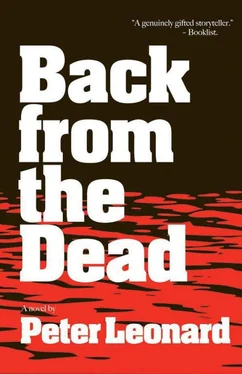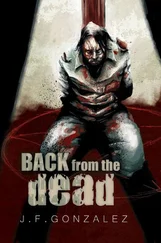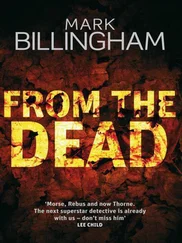The taxi dropped him at a cafe back on boulevard Gambetta. Hess phoned Marie-Noëlle to pick him up. He sat at a table inside, drank an espresso in two swallows, watching the street. The Fiat pulled up a few minutes later. He went outside and got in, looking around for a silver Peugeot.
“Monsieur, where is your car?”
“Antibes.”
She pulled away from the curb and made a U-turn, window down, left hand on the steering wheel, holding a cigarette between her index and middle fingers, shifting with her right. Hess felt claustrophobic in the small interior, his shoulder and Marie-Noëlle’s almost touching.
“What happened, if you don’t mind my asking?” She brought the cigarette to her mouth, blowing out smoke, and made a left turn. He was conscious of her earthy smell mixing with the cigarette smoke and diesel exhaust.
“Mechanical trouble.”
“Is the garage picking it up?”
Hess nodded. “Have you seen anyone else on the property?”
“No, monsieur .”
“Or cars parked outside the gate?”
“No, monsieur .” She dropped the cigarette out the open window.
“Any hunters?” On occasion Hess had seen villagers in the hills, hunting rabbits and quail.
“No, monsieur, no one.”
They rode the rest of the way in silence. Marie-Noëlle lit another cigarette, kept it hanging in her mouth as she drove the winding roads to the villa, shifting and down-shifting, the cigarette ash breaking off, falling in her lap, Marie-Noëlle brushing it on the floor.
Back at the villa, Hess contacted a service garage in the village just up the hill, and arranged to have his Renault towed there. Then he went to his bedroom and stood on the deck with binoculars scanning the hills and valley behind his property, and felt foolish when he saw Claude, the gardener, look up at him from trimming palm trees by the pool.
He went inside and took a thick wad of money out of his jacket pocket, counting the bills on the bed. $9,635 and 2,200 francs. He owned the villa free and clear, but selling it would take time. He would have to meet with realtors. And he owned twelve expressionist paintings and a couple dozen others that were, depending on their authenticity, worth either a fortune or nothing. But selling the paintings — going through an auction house or a gallery — would probably take even longer than selling the villa. He knew it was time to leave.
At 4:30 the manager of the service garage phoned to tell Hess his car had been towed to the lot but there was no way to check its functions without the ignition key. Hess said he would bring the key in the morning.
He waited until he was sure the garage was closed before he went to find Marie-Noëlle. She was folding clothes in the laundry room on the lower level.
“I need your help with something.”
“Yes, of course, monsieur. What can I do for you?”
“Drive me to pick up the car. They have it at the garage.”
“ Monsieur , are you sure? I can take Claude if you would rather not.”
Cordell had parked on the street in Antibes. Harry saw Hess walk into the restaurant at 12:10, and now all they could do was wait. At 2:40 Harry was getting concerned. He glanced at Colette and Cordell and said, “What do you think?”
“The French take their time eating but this is ridiculous,” Colette said.
“Maybe he’s not in there,” Harry said. “Slipped out, we didn’t see him, or went out the back.”
“What I was sayin’ earlier. Dude might’ve made us and took off.”
Colette glanced at Harry. “And leave the painting, a priceless work of art?”
“Unless it isn’t,” Harry said. “I’m going in.”
Harry got out of the car, waited for traffic to clear and crossed the street. Looked in Hess’ car. Nothing. He went into the restaurant and scanned the dining room. Only half a dozen tables were occupied and Hess wasn’t at any of them. He checked the men’s room. It was empty. He walked out and went around the block. There was an alley behind the restaurant. Hess could’ve walked through and come out here. But why?
Harry went back to the car. Cordell was on the sidewalk smoking a Davidoff. “Let me guess. Isn’t there, is he?”
“Where’d he go and why’d he leave his car?” Harry said, and saw Cordell focused on something across the street.
“Harry, check it out.”
Harry turned and saw the tow truck parked behind Hess’ Renault.
Colette rolled the back window down. “Maybe this explains it.”
“Maybe.” But Harry didn’t think so. “If Hess had car trouble he would’ve called a tow truck right away and stayed there.” Leaving the painting was another thing that didn’t make sense. He watched the tow truck lift the back end of Hess’ Renault.
They followed it to Nice and up the winding roads into the hills, past Hess’ villa to a garage on the outskirts of the village. They waited in a wooded area across the street from the garage until dark.
“Harry, we know where the man lives, what’re we doin’ here?”
Colette offered to go to the village and get food and coffee. “Let’s just give it a few more minutes,” Harry said.
And then he saw the Fiat drive in, the housekeeper in the spaghetti-western hat behind the wheel, and someone sitting next to her.
It was dark when they arrived in the village, the shops lit up. People picking up food on their way home from work, coming out of the bakery carrying baguettes, coming out of the butcher shop with cuts of meat wrapped in brown paper. Trucks and automobiles parked and double-parked, monsieur alert, looking about.
Marie-Noëlle pulled into the lot and put the car in neutral. The bay doors were closed, the lights off. Monsieur’s Renault was parked on the side of the building.
“I think it is not going to work today, monsieur . I can bring you back in the morning.”
“Where do you live?”
“Just down there.” She pointed north. “Half a kilometer.”
“Is your husband at home?”
“No, monsieur . Henri is delivering parts to Flins, gone for three days.”
“Show me your house.”
Marie-Noëlle glanced at him, wondering if he was serious.
“You have worked for me ten years. I want to see where you live.”
She was nervous now, riding with her boss to an empty house. They were alone in the villa much of the time and he had never made a pass at her. So what was this all about?
“How long have you been sleeping with Claude?”
Marie-Noëlle could feel herself blushing. How did he know that? They had been so careful. “Monsieur, I get lonely.”
“It’s all right. I understand. But Claude? I think you can do better.”
Monsieur sounded as if he was offering himself. But why now? And why her? She was thinking about the German model he had brought to the villa one time, tall and beautiful. She turned off the main road, monsieur staring at her legs working the pedals.
“There it is,” she said, slowing down, pointing to her small stone house, embarrassed, but this was where she lived. “Monsieur , have you seen enough? I can take you back.”
“Let’s go in.”
“Ah, monsieur. I don’t know.”
“You don’t know what? We are friends, aren’t we?” Marie-Noëlle didn’t see it that way. He owned the villa, and she worked for him. What was going on?
She drove to the house, parking near the side entrance, her heart pounding now. She opened the door, waited for him to get out and come around the car. She unlocked and opened the door to the house, and they went in. It was completely dark. Marie turned a lamp on in the salon, removed her hat, hung it on a hook and fussed with her hair, self-conscious about the way she looked.
Читать дальше












